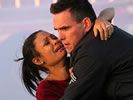Eye For Film >> Movies >> Crash (2004) Film Review
Crash takes place in contemporary LA over the course of 48 hours and charts the changing fortunes of the following characters: A white beefcake DA and his spoilt, obnoxious wife; two black gangbangers who wax philosophical about African-American culture, prejudice and hip-hop in between car-jackings; a paranoid, surly and rather dim corner-shop owner from Iran; a racist white cop and his well-meaning white rookie partner; a black detective and his Latino girlfriend; and a young mixed-race locksmith.
Even more schematic than it sounds, Crash is less a multi-character LA film in the mould of (say) Short Cuts, than a pedestrian and faintly pretentious monograph about race in post-9/11 America. That the film has received such high praise so far should come as no surprise since this is exactly the kind of well-meaning, heavy-handed, middle-brow issue-led film-making that critics and the Academy tend unthinkingly to regard as “important” and consequently get over-exited about. Yet after two hours of humourless melodrama, the kind of hysterical over-emoting that often gets mistaken for great acting and a lot of pretty unedifying dialogue, I could discern nothing more profound than “Can’t we all just get along?”

It’s ironic that for a film seeking to address the whole notion of prejudice based on ethnicity and colour, its characters should be defined by little else. Constructs designed to illustrate the various points Haggis wishes to make, they function not as complex human beings but as pawns which the director shifts crudely into position so that the issues he wants to raise have an excuse to be discussed. The stories are contrived and clumsily interwoven and the scenes themselves lurch tiresomely between prosaic ruminations, speechifying and screaming matches that escalate inexplicably out of nothing and then go nowhere.
Racial prejudice (in fact prejudice of all kinds) tends to be insidious, manifesting itself subtly in the behaviour and attitudes of people who claim to be untainted by it. But so keen is Haggis that no “t” should be left uncrossed and no “i” undotted, that the characters seem to talk about little else, lengthily expounding on their views at the remotest prompting. Characters are forever explaining their actions and justifying their positions and, in almost every scene, what motors the drama is not the conflicting personalities of the individuals, or even their class or gender. It’s the colour of their skin. Haggis doesn’t want to get to grips with the murky fundamentals of where racism or our fear of the “other” come from. He just wants to remind us that its effects are counter-productive, and that we’d achieve a whole lot more if we’d just try and love one another a little more.
So adolescent is the film’s approach to its own thorny subject matter that, without realising it, Haggis ends up undermining the very points he is attempting to gracelessly hammer home. Indicative of this lack of self-awareness is the patronising treatment of the token Middle Eastern character named Farhad - a highly strung, irrational and oversensitive loose cannon who spends about 90% of his allotted screen time yelling at people and making every situation he becomes involved with 100 times worse. Towards the end of the film, when an altercation with the earnest young locksmith erupts abruptly into violence, he retreats into religious superstition as a means of rationalising a seemingly inexplicable plot development. While Haggis seems to accept that this is good enough for the primitive intellect of his Iranian character, he nevertheless feels obliged to provide a more rational explanation for his more sophisticated Western audience.
Maybe all of this would be slightly more tolerable if Haggis had at least managed to fashion a genuinely passionate - if flawed - piece of polemic. But instead we get a blandly manipulative and cautious piece of political correctness, the chief concern of which seems to be that it ends up saying something positive, or worse still, “helpful”.
As the film nears its conclusion, Haggis’ mawkish streak, mercifully only sporadically in evidence until now, is allowed full rein. The hideous, omnipresent ambient score is cranked all the way up. The characters weep and stare into the middle-distance and hug and apologise and weep some more and say “I love you” to one another. Everyone gains a little self-knowledge, understanding and humanity; and everyone learns something both about themselves and their fellow man that’ll make them more tolerant, caring and thoughtful members of society. Which is super. Then, for good measure, we get subjected to the Stereophonics over the end credits.
Although not in the quite the same league of white liberal condescension as Norman Jewison’s unwatchable Denzel Washington vehicle The Hurricane (compared to which Crash is a model of tact and intellectual rigour), Crash is nonetheless an insipid and, at times, rather stupid contribution to the debate.
I expect it will get showered with award nominations.
Reviewed on: 01 Sep 2005





















